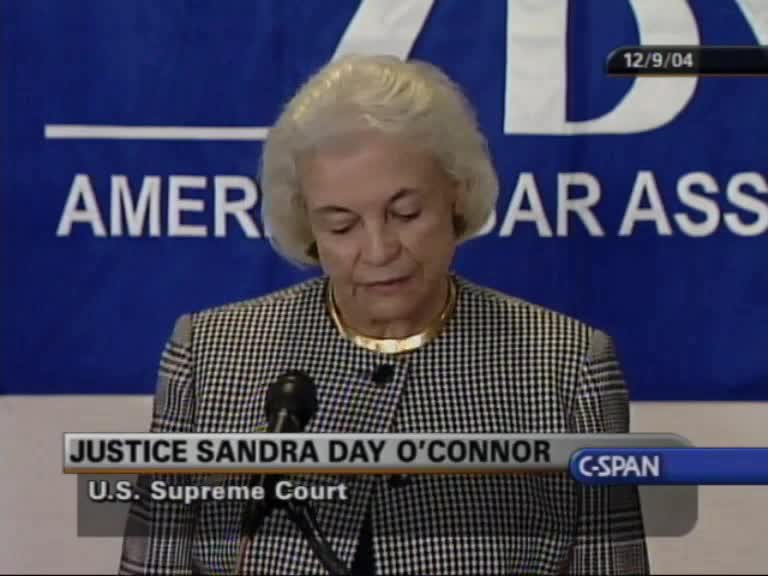Sandra Day O'Connor
Thank you, President Gray. I appreciate that so much. And thanks for letting me be part of the effort today. I think my interest in this came about because of my years as a trial court judge and dealing with jurors in a great mini criminal as well as civil cases. And the jury system in this country is one of the most enduring aspects of our legal system as a whole. And the only time that most Americans other than lawyers and letting them see the inside of an actual courtroom is when they're called to serve as jurors and juries have a proud history in this country as well as in England, where the jury as we know, developed today, Great Britain, Australia, Canada, New Zealand and the United States. Continue to use juries to hear evidence and determine facts. In a great many criminal cases. All only the United States and New Zealand continue to require use of juries in most civil cases. So it's a shrinking universe out there. The Russian Federation is experimenting with the use of juries in serious criminal cases. And that seems to be expanding now to all parts of the Russian Federation. I think juries usually their do their jobs very well and occasionally show extraordinary courage in the face of hostile judges, perhaps, and try to deliver the verdict that justice demands, even if it might not be the one that the judge might want. I presided over many a trial and in all but two or three cases, I felt that the jury reached an entirely Appropriate verdict. And the jurors were almost always very conscientious and sincere in trying to do a proper job.
Our federal constitution and all of its state counterparts guaranteed the right to trial by jury. And I believe deeply that that right is fundamental to our system of justice. I also think, though, that today, there are some serious problems with the jury system in the United States, in some states, more so than others. But I think that trying to solve those problems, is going to require some serious effort and commitment on the part of lawyers, judges, legislators and interested citizens. I think it's well worth the effort to try to preserve a properly operating jury system in this country. Now, by the 18th century juries and an England and in pre revolutionary America looked a good deal like they do today, except that only white male property owners were typically allowed to serve on juries. It took a long time for that to change. juries continued to be composed entirely of white property owning man until about 1860 when the first African Americans were allowed to serve on juries, and sex discrimination had a similar life sorry, history in this country. It was only after women secured the right to vote in 1920 that they had any serious hope of serving on juries. But discrimination persisted in a 1949, Massachusetts statute allowed trial judges to exclude women from any trial in which the judge thought women would likely be embarrassed by hearing that testimony. As late as 1966, three states still had statutes excluding women from jury service. Even even in states where women have the nominal right to serve on juries, many states had a system that
upheld affirmative registration plans man were subjected to jury service but women only if they had affirmatively registered a desire to serve on juries. And that system wasn't overruled until 1975. In a case in the United States Supreme Court only six years before I joined the court. So we've had some fairly recent experience, I think, with the last full participation possible for all segments of our society. And I think there are three ways that I have noticed, particularly needing attention. One is the conditions of jury service, and it varies widely from state to state and even from city to city. But when citizens are called to serve as jurors, they often see it more of a burden than a privilege. And for good reasons, sometimes they're not treated very well on arrival in the courthouse. And the conditions in which they serve are not very attractive.
I listened happily today as Chief Judge, Rufus King, outline some of the things available here to jurors, such as childcare, and a place where they can sit and conduct some business while they're waiting because there's a lot of waiting as a person potential juror. So we need to make that better. And we need to improve the process of jury selection to make that shorter and more efficient and less burdensome to the people called. And in the conduct of the trial. You know, even when I was serving as a trial judge, it was more common than not that jurors were told they couldn't take notes. They couldn't pass along a question they wanted asked. Things were pretty tough for jurors, and we can do a much better job than we did. And I'm very pleased that the American Bar Association has decided to take this on as a project. It's a good project and it's very appropriate for the American Bar, representing the nation's so many of the nation's attorneys. It has a good committee and Chief Judge Kay of New York has had experience revising the jury system in that enormous state and to that effect, so I'm optimistic that the presentation of some suggested changes will improve pushed along by the membership of the ABA and by people in every state. We're going to end up with a better system than we've had in the past and one that will continue to serve us well in the new century, and I'm very pleased that you've undertaken it. Very.
I'm leaving, this is oral argument week.
-We understand
.

